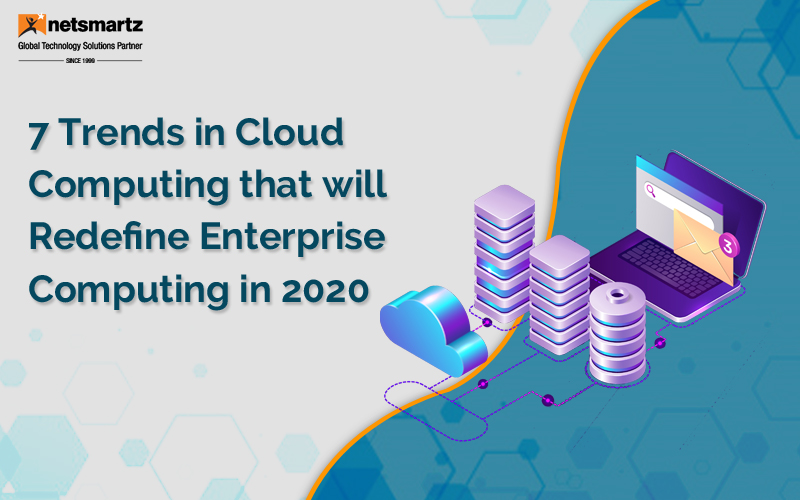The Continued Rise of Hybrid Cloud
When we talk about the trends in cloud and enterprise computing, it can only start with the concept of hybrid cloud considering the exceptional flexibility it proposes. This flexibility helps in designing the deployment model of choice, making the process simpler for enterprise cloud support providers. As long as we talk about the statistics, Gartner has said that 75 percent of the businesses would move to the hybrid cloud model by the year 2020. This simply signals for a revolutionary shift of enterprise computing towards a multi-cloud or hybrid cloud process improving the overall functionality that will deliver an added ease on operations.Edge Computing Taking the Lead
2020 will be the year where we are going to see a more prominent focus toward edge computing. With changing patterns in enterprise computing, Gartner has predicted that 75 percent of the data generated within the enterprise environment will be moved to the edge. Also, another report by Cisco has suggested that the total number of IP devices will multiply near three folds by the end of 2022. This means the data is going to be multiplied to three times or maybe more as of now. For this reason, most companies will switch to smaller edge data centers which would be geographically closer. Ultimately, 2020 will be a year that will turn towards edge computing where enterprises will aim for higher IT expenditure along with edge computing and co-location data centers.Increased Interest in Hyper-Converged Infrastructure
The concept of hyper-convergence is about integrating system, server, and networking within a single IT framework. For this reason, hyper-convergence is emerging as a huge trend that delivers centralized monitoring support with better scalability. Moreover, the future is set to be declining more towards the hyper-convergence rather than the older three-tier IT infrastructure. Also, the idea of hyper-convergence is growing as an alternative to public cloud systems because of the simplicity and cost deduction as compared to traditional systems.Increased Use of AI in the Data Center
When it comes to trends in any industry, AI is something that is definitely going to rule in 2020. The use of AI in the data center management will be made more prominent this year with pattern detection or failure detection in cloud network & hardware. AI would be of great help in the cloud to avoid any issues with the infrastructure even before they get into existence. AI will also be worked to explore past data to work on workload distribution and avoid any skill-shortage related errors. Furthermore, AI will help to automate so many tasks within the cloud server which are currently managed through human agents. Also, Gartner has made a prediction that businesses that will fail to integrate AI may have to suffer from an operational or economic crisis. Therefore, AI in Cloud would be an interesting trend to watch in the year 2020.Use of Containers for Cloud Portability will Grow
When it comes to convenient data storage on the cloud, the concept of containers has turned out to be a fascination for most organizations. According to a prediction raised by IDC, about 95 percent of micro-services featuring by the year 2021 would be set up using containers. This is entire because of the deployment advantage that brings in easier management of the operations done in the hybrid cloud. Also, the demand for high cloud portability within multi-cloud functions makes it viable to use containers for the added portability value. Therefore, 2020 will be a year where the use of containers in app development will be taking a lead along with benefits like workload shifting between cloud, reduced rate of downtime scenarios, and easier vendor adoption.Monitoring & Measurement
With the expansion of cloud models like multi-cloud and hybrid cloud, the demand for monitoring of environments will be increased. This is quite expected when the demand for sharing workloads on the cloud will be raised to ensure the right measurement of performance metrics. Therefore, it is very natural to consider 2020 to be a year more dedicated to the monitoring and measurement aspects. Also, the idea of aiming at monitoring and measurement process will help to gain control over essential cloud concerns related to security, data management, and consistency in the use, leaving no chances of downtime.Security, Reliability, and Flexibility in Cloud
Though the initial days of cloud computing were restricted to costs, most organizations running on the cloud would be aiming at other significant factors associated with cloud adoption. These would include cloud security, reliability, and flexibility of the system. Moreover, the statistics that were captured under the All Cloud’s 2020 Infrastructure report were highly inclining towards reliability and flexibility with security at the top. This made the cost factor roll down at fourth as all businesses working on the cloud are having maximum focus towards security.Conclusion
All in all, 2020 is going to be a year for cloud taking businesses on a roller coaster ride that turns through so many unique factors. In other words, cloud trends in 2020 will aim at all the significant components of cloud adoption and priorities related to the sustaining of the cloud. Therefore, the long term vision with the above trends will intend to capture everything that can enhance or affect cloud either it be technology implementation like hybrid cloud, containers or anything related to the business value like security, flexibility, etc. Interested to explore more about improvements in your current cloud model? Stay connected with our experts at Netsmartz.Summary
Kickstart Your Project With Us!
Popular Posts
CONTACT US
Let's Build Your Agile Team.
Experience Netsmartz for 40 hours - No Cost, No Obligation.
Connect With Us Today!
Please fill out the form or send us an email to







